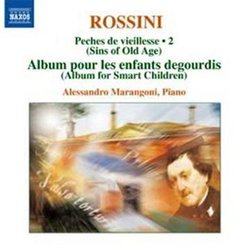| All Artists: Marangoni Title: Rossini: Complete Piano Music, Vol. 2 - Péchés de vieillesse, Vol VI - Album pour les enfants dégourdis Members Wishing: 0 Total Copies: 0 Label: Naxos Original Release Date: 1/1/2008 Re-Release Date: 1/27/2009 Genre: Classical Styles: Chamber Music, Historical Periods, Classical (c.1770-1830) Number of Discs: 1 SwapaCD Credits: 1 UPC: 747313076673 |
Search - Marangoni :: Rossini: Complete Piano Music, Vol. 2 - Péchés de vieillesse, Vol VI - Album pour les enfants dégourdis
 | Marangoni Rossini: Complete Piano Music, Vol. 2 - Péchés de vieillesse, Vol VI - Album pour les enfants dégourdis Genre: Classical |
Larger Image |
CD Details |
CD ReviewsMore of Rossini's Delightful 'Sins of Old Age' J Scott Morrison | Middlebury VT, USA | 01/30/2009 (5 out of 5 stars) "Gioachino Rossini quit writing the operas in his late thirties by which time he'd become rich and famous. From that time on he wrote little but late in his life, his 'vieillesse', he wrote 56 little piano pieces he called 'Sins of Old Age' ('Péchés de vieillesse'). He described these as 'A little of everything. Collection of 56 semi-comic pieces for the piano. I dedicate these to pianists of the fourth class, to which I have the honor to belong.' The present disc contains all but one of the pieces in Volume Six of that collection; the missing one is called 'Étude asthmatique'. (We are told that it couldn't be included, for reasons of space on the disc, but will be included on another disc in the series.) This, then, is Volume II of a series that will include all of Rossini's piano pieces. They are played by a thirtyish Italian, Alessandro Marangoni. And it is true that these mostly are works that are within the reach of moderately advanced amateurs. But there is nothing amateurish about Marangoni's playing. He has élan, a firm feel for the comic and the lyrical, and steely fingers. In the two pieces that overlap on his Rossini disc, I think Frederic Chiu may be slightly more satisfying, but Marangoni certainly has the goods and I have been delighted to hear this CD over and over.
As for the music itself, it is mostly tongue-in-cheek. For instance there are two pieces that go together. The first, 'Memento, homo', (the title comes from the Ash Wednesday liturgy 'Memento, homo, quia pulvis es, et in pulverem reverteris' ['Remember, Man, thou art dust, and to dust thou shalt return']) is indeed a mournful, solemn piece. But it is followed immediately by a piece called 'Assez de memento: dansons' ('Enough of Memento: let's dance'), and a silly, carefree dance it is. Another piece, 'Valse torturée' ('Tortured waltz'), has odd chord patterns and has various unexpected interruptions. On the other hands there are endearing pieces like 'Une caresse à ma femme', which is a love-letter to his second wife, Olympe, who nursed him in his latter ailing years. And 'La Pesarese' ('The Woman from Pesaro', Pesaro was Rossini's hometown) is a simple graceful folk-tinged lyric. Rossini's sense of humor can be heard in his 'Prélude baroque' which starts out as an homage to baroque style but soon turns into a highly decorated bel canto opera aria. The first piece in Volume Six of 'Péchés de Vieillesse' is called 'Mon prélude hygiénique du matin' ('My hygienic prelude of the morning') and it depicts waking up and making one's morning ablutions. Then there is 'Fausse couche de polka mazurka' ('Miscarriage Polka Mazurka') in which the orderly progression of the piece is repeatedly derailed. And similarly 'Un petit train de plaisir, comico-imitatif' ('A Little Pleasure Train, Comic and Imitative') depicts a train journey in which various things go wrong, including an accident in which two people are killed; one soul flies to Heaven, the other to Hell. A funeral march ensues. And speaking of funerals, the last piece 'Un enterrement en carnaval' ('A Burial during Carnival') depicts a funeral procession interrupted by the spirited music of the Carnival revelers. This is not great music, perhaps, but it is thoroughly enjoyable and it IS Rossini, after all, one of the composers, like Schubert, from whom memorable melodies seem to flow like water. Recommended for those who like their Rossini but don't know his piano music. Scott Morrison" |
